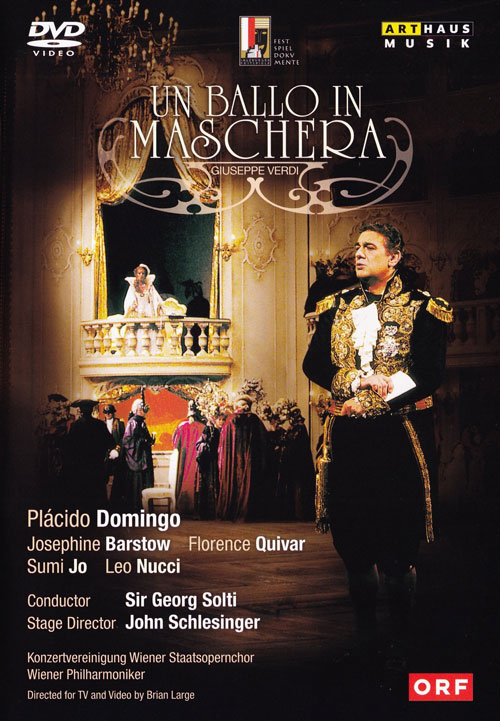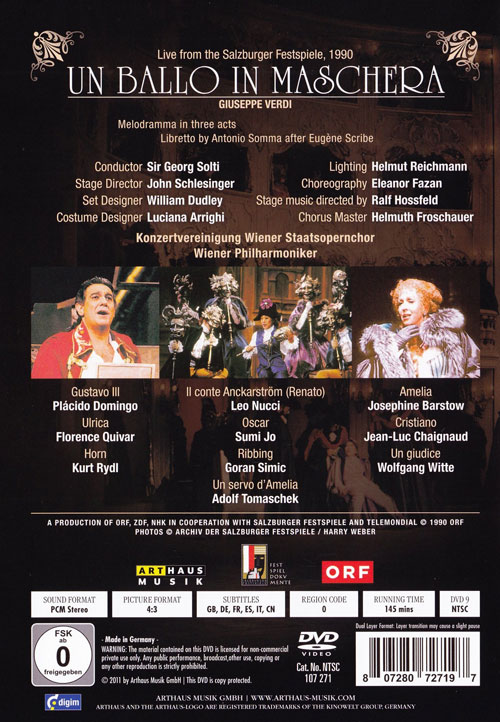Verdi: Un Ballo In Maschera / Solti, Domingo, Barstow, Jo [DVD]
Verdi: Un Ballo In Maschera / Solti, Domingo, Barstow, Jo [DVD] Conductor: Sir Georg Solti | Composer: Giuseppe Verdi | Chorus master: Helmuth Froschauer | Performers: Florence Quivar (Mezzo Soprano), Placido Domingo (Tenor), Josephine Barstow (Soprano), Leo Nucci (Baritone), Sumi Jo (Soprano), Kurt Rydl (Bass), Wolfgang Witte (Tenor) | Orchestra/Ensemble: Vienna Philharmonic Orchestra | Label: Arthaus Musik | DVD | NTSC 4:3 | LinearPCM, 2 ch | File hosts: Uploaded.net, share-online.biz | 5% recovery + 2 .rev files | Run time: 2 Hours 25 Mins. | 8.07 GB Language(s): Italian | Subtitle(s): Italian, German, English, French, Spanish
Verdi: Un Ballo In Maschera / Solti, Domingo, Barstow, Jo [DVD] Conductor: Sir Georg Solti | Composer: Giuseppe Verdi | Chorus master: Helmuth Froschauer | Performers: Florence Quivar (Mezzo Soprano), Placido Domingo (Tenor), Josephine Barstow (Soprano), Leo Nucci (Baritone), Sumi Jo (Soprano), Kurt Rydl (Bass), Wolfgang Witte (Tenor) | Orchestra/Ensemble: Vienna Philharmonic Orchestra | Label: Arthaus Musik | DVD | NTSC 4:3 | LinearPCM, 2 ch | File hosts: Uploaded.net, share-online.biz | 5% recovery + 2 .rev files | Run time: 2 Hours 25 Mins. | 8.07 GB Language(s): Italian | Subtitle(s): Italian, German, English, French, Spanish

The performance on this DVD was recorded when Un ballo in maschera was revived for six performances the following year, with the same cast and with Solti back on the podium. However, 40,000 applications for tickets could not be met, and it may have been some comfort to the ticketless that ORF transmitted the première live on television - not only to Austria but also simultaneously to Japan. The joint enterprise with NHK Tokyo also involved state of the art technical resources.
Watch a Trailer (sample is a lower resolution than actual DVD or Blu-ray):
This "operatic feast for posterity", as it was called by Vienna's Kurier, has now been released from the archives of Austrian Television for the enjoyment of opera lovers all over the world. It brought together all the visual and musical ingredients that make lyric theatre a fascinating experience and perfectly suited to the audio-visual medium, too. This performance can claim for a special place not only in the history of opera but also in the history of opera on DVD.
CAST:
Gustavo III - Placido Domingo
Amelia - Josephine Barstow
Oscar - Sumi Jo
Horn - Kurt Rydl
Un giudice - Wolfgang Witte
Il conte Ankerström (Renato) - Leo Nucci
Ulrica - Florence Quivar
Christiano - Jean-Luc Chaignaud
Ribbing - Goran Simic
Un servo - Adolf Tomaschek
REVIEW:
Göran Forsling, MusicWeb International
A brief reminder, to begin with, of the chequered history of Un ballo in maschera. Antonio Somma wrote the libretto, based on a play by Eugène Scribe, entitled Gustave III (1833). This, in its turn, was based on some historical facts concerning the assassination of King Gustav III of Sweden in 1792. The background was a political conspiracy but Scribe embroidered proceedings with a love story between the king and Amelia. Censorship in Italy in the late 1850s would not accept the portrayal of a king being murdered on the opera stage and the story had to be reworked. This happened, not once but twice and it all ended up in the transportation of the action from Stockholm to Boston during colonial times. The king became the British governor. In that shape it was premiered in Rome on 17 February 1859 and was an immediate success. It rapidly spread to New York and London and has ever since been regarded as one of Verdi’s best operas.Works on This Recording
When the delicate political situation of the mid-19 th century was but a memory, directors wanted to restore the original story. Copenhagen in 1935 was first and the Metropolitan Opera in NY was not far behind in the early 1940s, when Jussi Björling was Gustavus III. He had sung the role in Stockholm a few years ago but then he was Riccardo. In Gothenburg, Sweden, a reconstruction of the first reworking, entitled Una vendetta, was seen in 2002 (also recorded).
Behind the present production was Herbert von Karajan’s wish to mount the Swedish Ballo at the Salzburg Festival in 1989. He had already recorded the opera on CD with his contracted cast but when stage rehearsals in Salzburg had already begun he died on 16 July. Who was there to replace a Maestro who had been almost synonymous with the Festival for more than thirty years? There was only a week to go before the premiere. The other great Maestro of the time, Georg Solti, turned out to be free and stood in for his rival with excellent results. He had conducted the opera since the late 1950s. He had also made two recordings of it, the first intended to star Jussi Björling as Riccardo. At the recording sessions in Rome in the summer of 1960 fate stepped in with a controversy between Solti and Björling and the sessions were cancelled. Two months later Björling was dead and Carlo Bergonzi took over the tenor lead. He was no doubt the best equipped and best suited to step into Björling’s shoes but it is sad not to have a studio recording with the Swedish tenor, still at the height of his powers.
There were six performances of Un ballo in maschera in 1989. The following year there were another six and then it was filmed by the Austrian Broadcasting Corporation.
We are indeed lucky to have this excellent cast in this lavish production. Visually it is very traditional – no quirky ideas and innovations; just a truly beautiful and magnificent staging. Have a look at the cover picture above to see what I mean. Sir Georg was 78 at the time but as intense as ever in the dramatic moments – and there are many. He was also able to relax in a way he rarely did until the last few years of his career. All in all there could be no better foundation for a thrilling performance. The Vienna Philharmonic, who had known Solti since the 1950s, played like gods and the male voices of the Staatsopernchor were as ominous as any other opera chorus I have heard.
In the centre of the proceedings Placido Domingo is noble and dignified. He sings better than in any of his three complete audio recordings, finding more nuances than ever – and the golden tone has lost none of its bloom. He sings the testing Di tu se fedele with ardour and elegance and the great duet with Amelia matches even the recording with Bergonzi and Leontyne Price for Leinsdorf. Domingo’s Amelia is Josephine Barstow, who for me was the disappointment on the Karajan recording. There I found her over-vibrant and shrill. A superb actor she was deeply involved and here she combines this quality with glorious singing. Her second aria is one of the highlights of this performance.
Leo Nucci has always been a dependable but not always very sonorous singer. He is serviceable here rather than excellent, rather dry-toned but he is a good actor and he has some fine moments of lyrical restraint in Eri tu. Florence Quivar is a magnificent Ulrica. She has a voice reminiscent of that of Shirley Verrett - a great Ulrica on the Leinsdorf recording. The diminutive Sumi Jo is a brilliant Oscar and Kurt Rydl and Goran Simic make the most of the conspirators Horn and Ribbing: Tom and Samuel in the Boston version.
Brian Large – how many such productions has he made? – never misses a point and lets the viewers savour the luxurious sets. I have seen some interesting ‘modern’ productions lately – thought-provoking and fascinating no doubt – but Schlesinger and William Dudley have here come up with something timeless and all-embracing. It’s hard to resist. Readers with non-traditionalist leanings should look elsewhere, but to everybody else, who needs one DVD-version of Un ballo in maschera, I can enthusiastically say: Here it is!
1.
Un ballo in maschera by Giuseppe Verdi
Performer: Florence Quivar (Mezzo Soprano), Placido Domingo (Tenor), Josephine Barstow (Soprano), Leo Nucci (Baritone), Sumi Jo (Soprano), Kurt Rydl (Bass), Wolfgang Witte (Tenor)
Conductor: Sir Georg Solti
Orchestra/Ensemble: Vienna Philharmonic Orchestra
Period: Romantic
Written: 1859; Italy
Date of Recording: 28 July 1990
 No Password
No Password


0 comments:
Post a Comment